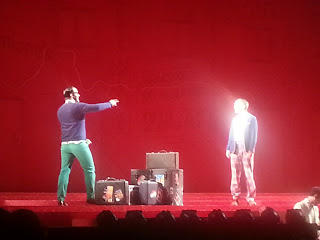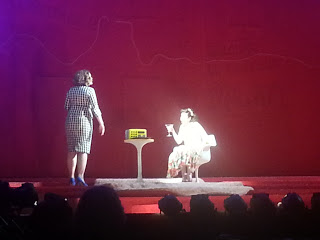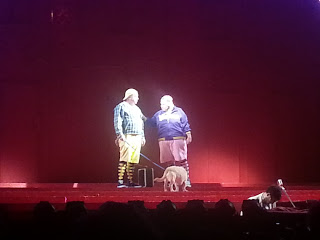So I did get to see Joss Whedon’s Much Ado About Nothing last week, and only now am I finding the time to write about it. This is no way reflects how much I loved this movie.
Loved it. Love love loved. I was not yet out of the movie theatre before I tweeted something like “A revolution in Shakespeare movie making.”
Now, let’s talk about it in more detail. I’m pretty sure that all my regular readers already know the details, but I’ll take you through them just in case. Director Joss Whedon and a bunch of his friends regularly hang out at his house and do script read-throughs like regular people might play board games. These friends of his include Alexis Denisof, Amy Acker and Nathan Fillion, all of whom you’ve seen before in various Whedon creations (Buffy, Firefly, Avengers, etc…) Yes, I said Avengers — Agent Phil Coulson is even in this one.
So, anyway, Whedon says to his crew one day, “This time we’re going to film it.” And there you have it. Twelve days of filming his friends, at his house, using his own stuff as props.
What we get is not perfect, and it’s driving some of the Shakespeare purists nuts, but I love the end result. I want him to do this again and again.
Much Ado About Nothing maps wonderfully to our situation. Leonato basically welcomes some very important guests to his house and throws a huge party, which soon turns into a wedding (and then a funeral, and then a wedding). You absolutely buy this, right from the beginning. The limousines arrive outside, Leonato and his family go to greet their guests, and it all just works. We even get a shot of Benedick and Claudio being led up to the room where they’ll be staying, decorated with stuffed animals – *exactly* what happens when guests come to stay at someone’s house and get put up in whatever rooms are available (in this case perhaps a daughter’s room?) We walk the halls with characters, we spot the housekeepers putting away laundry in the background. Later we’ll see Benedick running up and down the stairs in sweatpants, getting in his daily workout. There was never a time in this movie that I did not think, “Ok, cool, a rich guy is putting up guests in his house for the week” … because that’s exactly what was happening. Genius.
The masquerade scene is absolutely gorgeous. There’s entertainment, there’s the pool, there’s groups of people just hanging out and chatting. Something that I loved, that I wish he’d carried through the whole movie, is that the soundtrack turns out to be a guest singing at the piano. After all, none of us have a soundtrack to our lives, but we do occasionally walk into situations where there is music. In a later scene we again hear music, only to discover that Don Pedro has found a guitar and is sitting in the corner picking away at it while people are talking.
Ok, let’s talk about the characters. I could talk all day about how this movie looks, but what I’m sure everybody wants to know is how well they performed it. Let me say a couple of things up front to set the stage. I think my favorite performance was Reed Diamond’s Don Pedro. I don’t know what sort of Shakespeare experience he’s got, but I thought his delivery was spot on, hitting the right combination of selling the Shakespeare while still acting his part, if that makes sense. He was the visiting dignitary, a guest in Leonato’s home. Half the time he looks like he might have been drunk, but that was also totally in character.
Second favorite? Fran Kranz as Claudio. This version of the play tries to make it all about Claudio/Hero, rather than Benedick/Beatrice, and I’m ok with that. This will drive MAAN fans nuts, I’m sure (more on the weaknesses of B&B in a bit). I realized very quickly that this was turning into a wonderful romantic movie that just happened to be a Shakespeare movie, rather than the other way around, if that makes sense. We Shakespeare geeks can talk about Claudio/Hero as being this little side story when really we want to dig into the interchange between Benedick and Beatrice, but really, does the random movie goer with no background knowledge of the story want that? If you just follow the plot, doesn’t it make more sense that people would think it’s more about Claudio? Claudio’s the one getting married (and he tells his friend Benedick about it). Claudio’s the one that gets screwed over, and then screws himself over by reacting so poorly over the news, and Claudio’s the one that has to fix it in the end.
Something that I really liked is that Don Pedro and Claudio were buddies throughout the show – everywhere you saw one, you saw the other. That worked perfectly for Don Pedro as the half drunk dignitary who just wandered from situation to situation trying to keep everybody happy, and it worked to elevate Claudio by always having him in the Don’s company, as if every time Benvolio showed up, the Prince entered as well. I’m not sure I love that analogy, I’ll work on it.
Ok, now let’s talk about the weaknesses. I, like many, did NOT like the chemistry between Benedick and Beatrice. I’m sure Whedon fans were excited to see Acker and Denisof as a couple again (apparently they were, in some other show?) but I know nothing about that. If anything, I recognize Denisof as one of Robin’s boyfriends(?) on How I Met Your Mother.
I thought Whedon would do more with Beatrice. The movie opens (I don’t think this is a spoiler) with a “next morning” scene, and a man slipping quietly from Beatrice’s bed and leaving without a word. “Interesting,” I’m thinking, “Is this supposed to establish that Beatrice is looking for love, and never finding it? Always ending up with the wrong guy?” But it turns out I completely misinterpreted that scene.
The thing is, while it’s established early that she is interested in Benedick, you never understand why. He’s a bit of an ass, right from the very beginning. The banter between the two can be done mutually, they’re both playing the same game. But here it’s far more obvious that Benedick goes for the easy cheap shots, and it visually upsets Beatrice when he does that. I think there’s even a line, I can’t remember off the top of my head, where she says almost exactly that. She’s having fun, he’s being mean. That, coupled with my earlier guess that Beatrice keeps getting involved with the wrong men, just points to Benedick as another one of the wrong ones, not Mr. Right.
Denisof’s Benedick is good when he’s doing the physical comedy. The scene where Don Pedro, Claudio and Leonato are trying to convince him that Beatrice loves him was hysterical, to the point of being ridiculous (it is painfully obvious that there’s no way they do not see him). Later when he starts strutting in front of Beatrice (knowing that she likes him) is again funny, but in a far more predictable way. But you know what? Sometimes predictable is ok, getting back to the idea of “the audience that just walked in without knowing what to expect.” People don’t always want to analyze. Sometimes they just want to laugh. And they’ll laugh, a lot, at Benedick.
A quick note on Nathan Fillion as Dogberry? From where I sit, he’s the biggest star. Maybe that’s just because I recognize him more than the others. So I was waiting for him for the whole movie. Is it fair to say that I laughed my head off the entire time, and yet I was disappointed? It’s as if he was the least comfortable with his Shakespeare, and decided that he was going to “make it his own.” Everything he does and says is brilliantly funny, but it feels the least like Shakespeare. Does that make sense? If you didn’t know he was doing Shakespeare, you might not even realize it. Again, this is one of those situations that I think works best for the non-Shakespeare audience, so my disappointment comes more from the fact that I was hoping to see out of him what I saw out of Don Pedro – somebody who could deliver a believable, entertaining character, while still leaving no doubt that he was performing Shakespeare.
I’ve got to wrap this up, so let me see if I can explain why I love it so much despite its “flaws”. I love the idea of a small, intimate Shakespeare movie like this. A bunch of friends get together in close quarters for a little while. There are fights, there are disagreements, there is laughter, there is arguing, and everybody makes up in the end. If you judge a movie like this primarily on its Shakespeare, it will likely come up short. But if you want your Shakespeare to be timeless and universal, the kind of story that’s been relevant to audiences for four hundred years and will continue to be for another four hundred? Whedon’s approach demonstrates a whole new way to go about that. It’s not just the intimate setting. The lopsidedness of some of the performances only adds to it. Some are excellent in their delivery, some aren’t. It’s like a Shakespearean dial that gets turned to low in some scenes and medium-high in others. When others have done “modern Shakespeare” they’ll just go ahead and rewrite most of it, leaving only the key lines. That’s awful. That points a big spotlight at the text and says “Look where we shoehorned in that line!” What we get in Whedon’s version isn’t even planned. It’s not like he told Reed Diamond to bring the Shakespeare more than, say, Don John. He threw all of his ingredients into this particular pot, stirre it around a bit, and let everybody find their stride. The result is natural, approachable, and wonderful. Go see it, preferably with someone who knows nothing about Shakespeare, then ask their opinion.
A quick note on parental guidance, and bringing the kids, since everybody knows this is an issue with me. I will not be letting the kids see this one, for two or three particular scenes. First is the “morning after” scene I spoke of that opens up the movie. This one isn’t too bad, though, and it’s easily skipped past. Second comes a scene that makes it obvious that Don John and Conrad (who is played by a woman here) are a couple. This includes getting horizontal on the bed and helping her out of her clothes. Hmmm. Little bit harder to explain away that one, since it is a long scene. And then of course at the end is the Margaret/Borachio scene, which plays out like it always has (well, since Branagh I guess). None of these scenes have any overt nudity, it’s primarily a question of what else happens. The Don John / Conrad scene is probably the worst, since it involves the most overtly sexual contact between the two.




